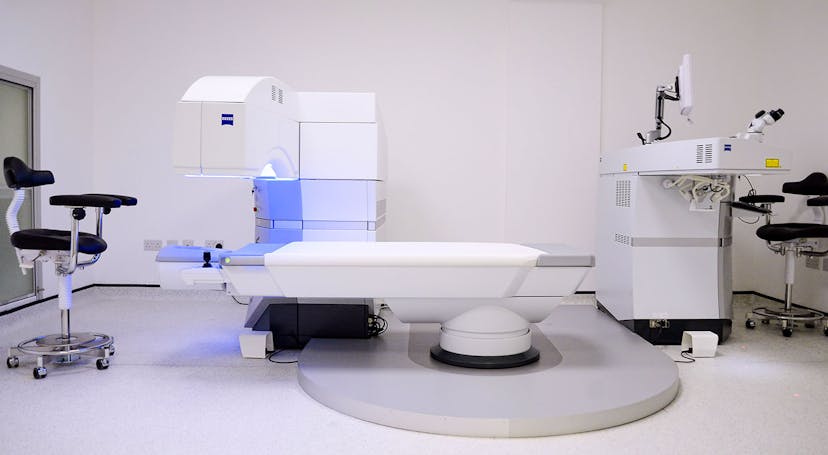
What Is Refractive Surgery? Can It Help Me Get Rid Of My Glasses?
Refractive surgery is carried out on the eye to change its focus.
It is usually performed to bring the focus into a natural zone where no glasses or contact lenses are required to see clearly. Most refractive surgery is carried out on the cornea using lasers.
Refractive laser eye surgery has now reached the point where it is possibly safer to have one’s vision corrected by this method. This is rather than having it corrected by wearing soft contact lenses.
People with normal vision who do not require any glasses or contacts usually have an eye that is focused either slightly myopic (shortsighted) or slightly hyperopic (longsighted).
Almost no one has a focus of zero.
However, anyone who has a vision in this zone can see clearly and regards themselves as independent of glasses. This is the normal state for the human eye. Very complex and poorly understood mechanisms act during the growth of the eye to bring about this state of sharp focus.
Increasingly in modern life, it appears that these complex mechanisms are thrown out of balance and more and more people find that they require a correction in the form of either spectacles or contact lenses to see the distance clearly.
In young people up to the age of approximately 45, the human eye is naturally focused for distance and then autofocuses for intermediate and near.
This state is referred to as emmetropia.

Ametropia is the state where the eye is not in focus and requires an optical correction to see clearly.
Ametropia is on the increase and in certain parts of the world such as the Far East there is what is regarded as an epidemic of myopia, with up to 85% of young people requiring a myopic correction to see clearly.
Little is known as to why this is occurring. Emerging evidence seems to indicate the amount of time spent outdoors as a very young child can protect against the development of myopia.
It is also possible that there are genetic factors involved. This means that if your parents were hyperopic or myopic your chances of being so are also increased.
Fortunately, concurrently with this worldwide increase in ametropia,
Laser technology has undergone enormous progress and now a huge percentage of ametropes can have.
The best lasers do this by reshaping the contour of the corneal surface so that it changes the focusing power. Scientifically derived nomograms are employed so that just the right amount of laser power is applied to bring that particular eye back to normal focus.
In the last few years, enormous strides have been made in increasing the safety and accuracy of these procedures.

Key Points About Refractive Surgery
- Types of Refractive Surgery: Common types of refractive surgery include LASIK (Laser-Assisted In Situ Keratomileusis), PRK (Photorefractive Keratectomy), LASEK (Laser Epithelial Keratomileusis), and SMILE (Small Incision Lenticule Extraction). Each procedure has unique characteristics and considerations.
- Procedure Overview: Refractive surgery works by reshaping the cornea, the clear front part of the eye. This adjustment allows light to focus correctly on the retina, leading to improved vision.
- Suitable Candidates: Ideal candidates for refractive surgery are typically adults with stable vision prescriptions who are in good overall health. A thorough pre-operative examination is essential to determine suitability.
- Pre-Operative Evaluation: Prior to surgery, patients undergo a comprehensive eye examination to assess their refractive error, corneal thickness, and overall eye health. This evaluation helps determine the most appropriate procedure.
- Procedure Duration: Refractive surgery is typically quick, with the actual procedure lasting only a few minutes per eye. LASIK, for example, often takes about 15 minutes for both eyes.
- Anesthesia and Discomfort: Most refractive surgeries are performed with the aid of numbing eye drops, making the procedure virtually painless. Some patients may experience mild discomfort or a gritty sensation after the surgery.
- Recovery Period: Patients often experience an immediate improvement in vision after the surgery, although it may continue to improve over a few days. Following the procedure, there is a short recovery period during which patients are advised to rest and avoid strenuous activities.
- Post-Operative Care: Patients will have follow-up appointments with their surgeon to monitor the healing process and ensure optimal results. They will receive specific instructions for post-operative care, including the use of prescribed eye drops.
- Potential Risks and Complications: While refractive surgery is generally safe and effective, there are potential risks, including dry eyes, glare, halos, and in rare cases, over- or under-correction. A thorough discussion with the surgeon about potential risks is crucial.
- Long-Term Results: Refractive surgery often provides long-lasting vision correction. However, it's important to note that age-related changes in vision, such as presbyopia (difficulty focusing on close objects), may still occur.
- Cost Considerations: The cost of refractive surgery can vary based on the type of procedure, the surgeon's experience, and geographical location. It's important to inquire about any potential additional costs, including pre-operative evaluations and follow-up appointments.
- Alternative Options: In addition to surgery, alternative options for vision correction include glasses and contact lenses, as well as newer technologies like orthokeratology (Ortho-K) and implantable lenses.
Discover My-iClinic On Your Vision Correction Journey
Experience the pinnacle of refractive surgery at My-iClinic, London's leading destination for vision correction. Our renowned surgeons, state-of-the-art technology, and exceptional patient care set us apart. Don't let refractive errors hold you back. Schedule your consultation today and step into a future of clear, vibrant vision. Contact us or visit our London clinic to embark on your journey to visual freedom.
Find out more by Speaking to our team









